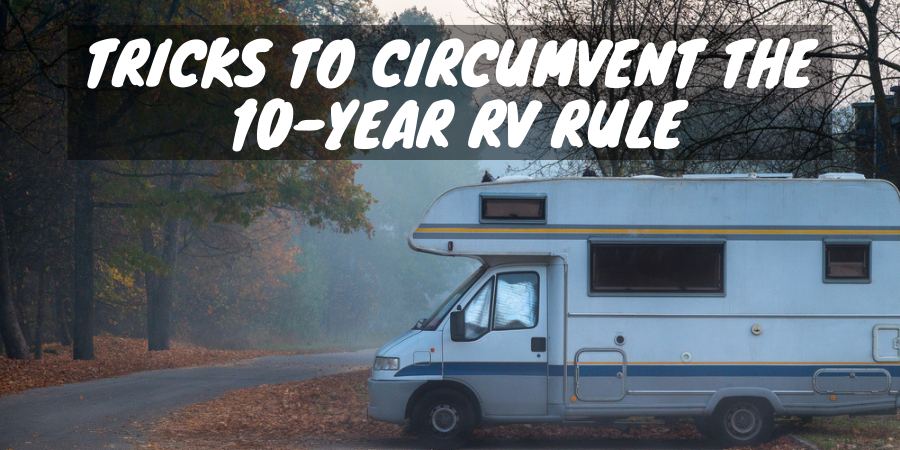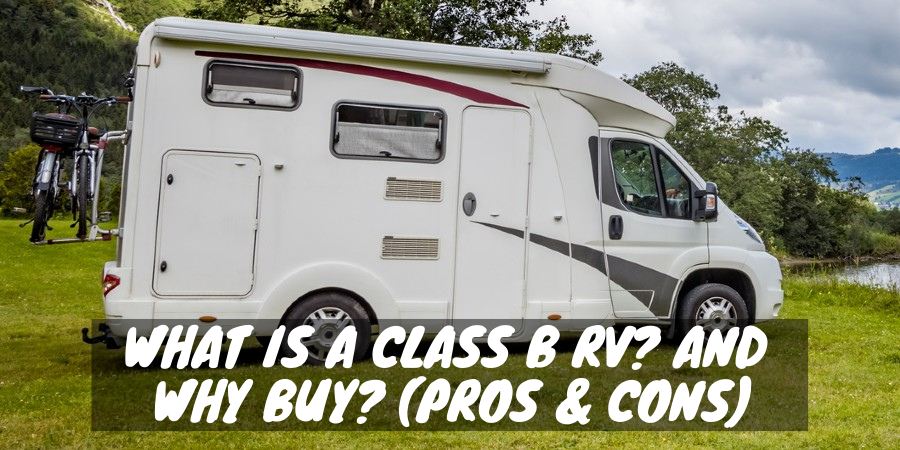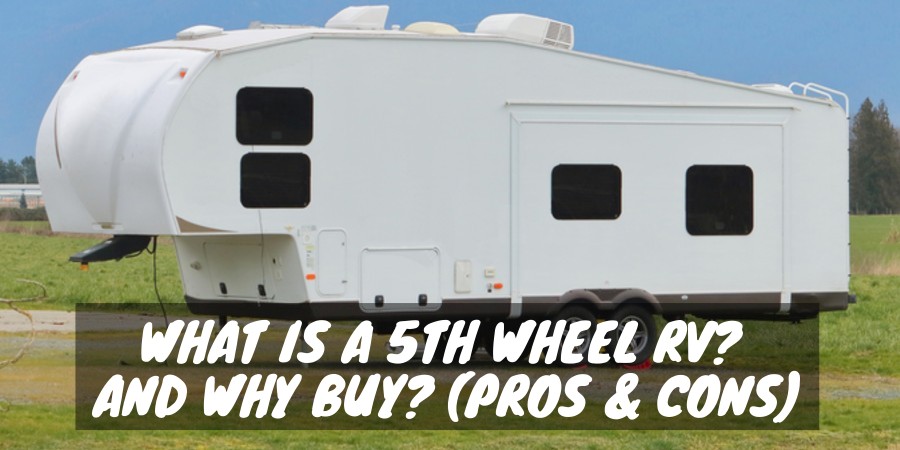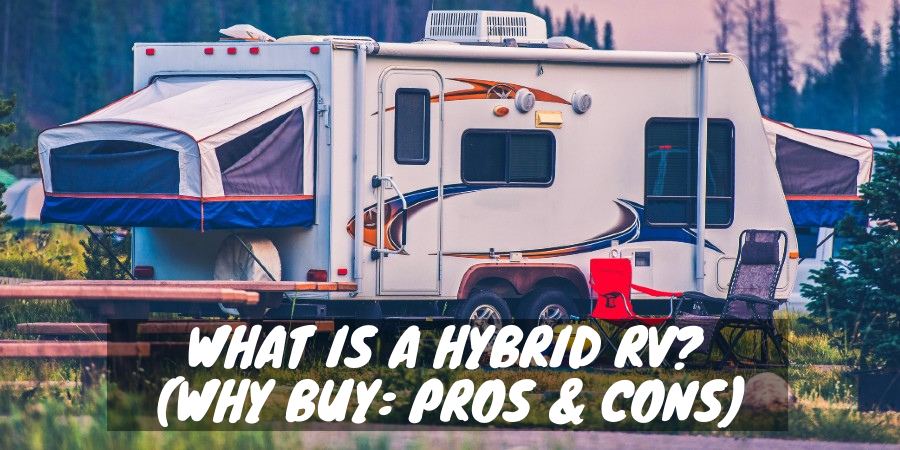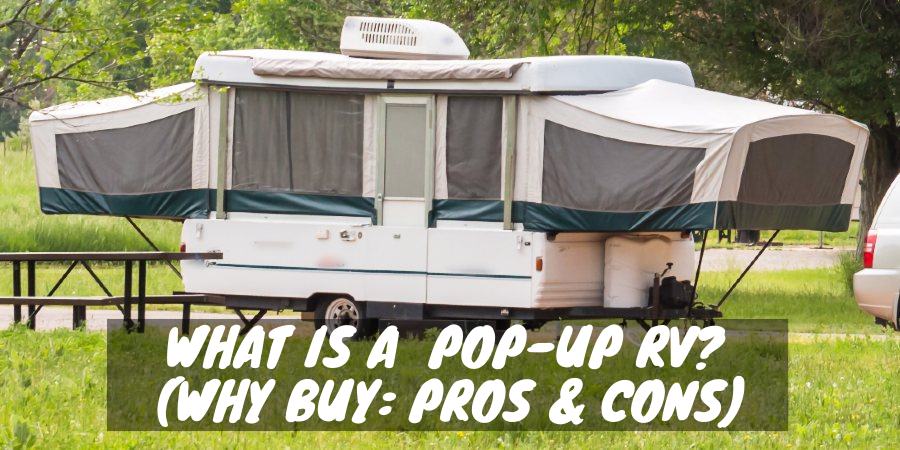The 10-year rule is a real consideration for people with older campers who want to book an RV park vacation, but thankfully, there are tricks to avoid hassles.
Most RV parks have a 10-year rule on recreational vehicle age to control who they’ll admit to their campground, but do they enforce it?
The answer depends very much on the RV park’s management.
To help you figure out the best ways to convince an RV park to allow your vintage or older camper, keep on reading. As a full-time RVer with a 37-year-old motorhome, I have years of experience handling this issue, and I share my tips down below!
Why Campgrounds Have a 10-Year Rule
The 10-year RV age rule is one aspect of campground reservations that many new RV owners are unaware of.
Being asked during your booking about the make and age of your camper may throw you off, or you may not give it much importance, but they’re asking for these reasons:
Maintaining Nice Campground Aesthetics
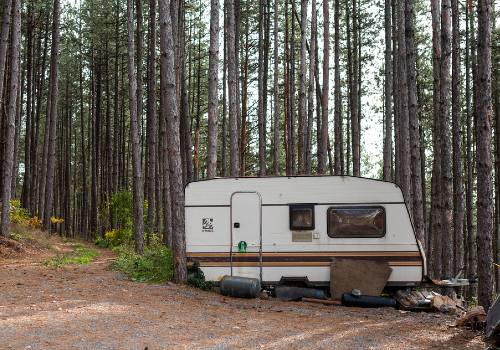
Ratty-looking RVs bring down the curb appeal of any campground and drive away business.
Park owners need to have a way to keep out any RVs they deem below their standards, so they pull out the 10-year rule when necessary to avoid getting into an argument with the camper’s owner.
The rule is also to keep guests happy, as no one who spends lots of money on a new RV wants to have an old rust-bucket park in the next campsite.
One RV in horrible shape will often get a mention in campground review websites, which in turn can ruin an RV park’s reputation.
Campgrounds often rely on these websites as a free word-of-mouth advertising source, so keeping out older RVs is a way to safeguard their park from bad reviews and the downturn in revenue.
Another campground management fear is an old RV breaking down at the campsite and not leaving on schedule.
RV Park Safety Regulations
Many campgrounds have regular inspections by the health department and other county or state regulators.
Often, these visits are unannounced, and parks must comply with inspections or be shut down. Violations can lead to hefty fines.
Part of the inspections includes checking for leak-free water and sewer connections and a peek underneath campers and tow vehicles for dripping holding tanks, oil, or transmission fluid.
Any issues that have a negative environmental impact will create headaches for the RV park, so making certain motorhomes, travel trailers, and tow vehicles are newer models lowers the chance leaks will happen.
RV Campground Type
RV “luxury resorts” are the new trend, and owners of these parks are very selective on the type and age of recreational vehicles they let in, so the park retains a high standard and exclusive appeal.
To keep out the riff-raff, these types of RV parks not only enforce the age rule but may shorten what they deem acceptable to even fewer years than 10.
Tricks to Circumvent the 10-Year Rule

I had no clue about the age restriction rules of most campgrounds when I bought my vintage motorhome. By the time I did learn about it, I had already had my renovations complete.
While I did have fears this rule would ruin my RV traveling plans after all the work I put into my camper, I wasn’t turning back.
After some trial and error and plenty of questions to other older RV owners, I came up with a list of ways to gain entry into RV parks without fail.
So, don’t feel you must purchase a new RV once your camper is pushing a decade in age or shy away from buying an affordable, older unit. You’ll be fine and can camp just about anywhere when you take the following tips to heart.
Choose Your RV Park Wisely
The most basic way to avoid your old RV from being turned away by a campground is to skip those that discriminate not just on age but other factors like the type of recreational vehicle you own.
Bypass fancy Motorcoach Resorts that only allow large Class A motorhomes or newer RV parks that mention they strictly adhere to the 10-year rule, as these parks often require proof of registration upon check-in to verify the age of your camper.
Most other RV campgrounds may have the rule in place, but rarely will you encounter rejection if you have money to pay for a reservation.
The majority of RV parks won’t ask guests for proof of camper age, and unless you’ve got a Christmas Vacation eyesore, management will let you stay.
Be aware that if you do have an RV in very poor condition, they’ll put out the “rule” as a reason to keep you out.
Have Pictures of Your Camper Ready
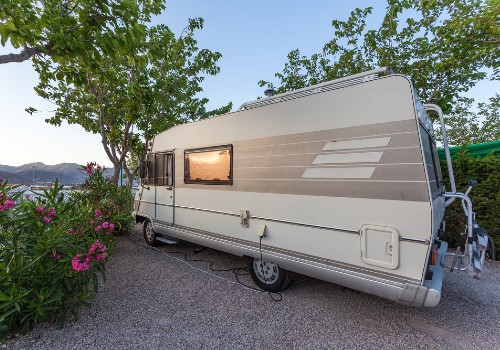
My advice to older RV owners is to wash, wax, and beautify your camper, then take pictures of the exterior all the way around and save them to your phone and computer.
If a campground asks about your RV’s age, you can choose to be honest if it’s older than ten years and see how they react.
Most may mention their age rule but will bypass it if you can prove your RV’s appearance. Shooting over pics via email or text is the fastest way to get approval and a reservation.
If I had to retake and send pictures each time I was making a reservation, it would jam up my life, so having my RV pictures handy saves lots of time if I encounter the need to provide proof my camper is in good shape.
RV Cleanliness
Older RVs seem to look dirtier more quickly than newer models. Keeping your camper as clean as possible before checking in to a park is crucial to skirt the 10-year rule.
A dirty RV will draw more attention than one that comes in shiny and clean. When the office staff sees your camper pull into the lot (trust me, they are watching), they’ll instantly give you a pass or fail on looks.
If your RV is filthy, you’ll get fail. Expect to have a staff member come out for a closer inspection, which may lead to the park denying your reservation.
If you’ve driven a long way and your camper is dirty, stop into a self-serve car or truck wash and rinse off as much grime as possible, or get out some rags and wipe off the dirt or bugs before checking in to the RV park.
Upkeep of RV Exterior
The top things that will trigger a closer inspection by reservation staff when you book into an RV campground are:
- Peeling decals
- Rust
- Dents or holes
- Worn, faded paint
- Torn awnings
- Windshield cracks
Any of these things are more likely to be found on RVs more than a decade old, so making sure your camper is in the best possible condition is an easy way to bypass age-restriction rules.
Replacing an old, frayed awning isn’t that expensive, nor is removing curling decals or sanding away and sealing off the rust.
If you want to enjoy taking your older RV to most campgrounds, you’ll have to invest some time and money in keeping the exterior as neat and damage-free as possible so management has no excuse to keep you out.
Aside from the exterior, do watch out for what people see through your RV’s windows.
Using towels, sheets, flags, posters, cardboard, or silver foil insulation as window coverings will cause problems. Install shades or curtains that match your camper’s exterior design and color scheme to remain low-key.
Go Vintage or Buy a Common Design
Old Airstreams and other classic campers will nearly always get an instant pass if you restore them.
Any vintage camper will increase interest within the campground and cause other guests to remember the park more fondly. No RV park manager will let such an easy “advertisement” go to waste.
Another way to not worry about the age rule is to buy a basic, no-slide travel trailer with a design that doesn’t change from decade to decade.
While motorhomes and campervans change exterior styling every few years, making them easier to date, many travel trailer models retain the same shape.
You can easily say your trailer’s a 2017 model when it’s really from 1990, and no one will know as long as the exterior is well-kept.
Making Minor Upgrades to the RV

My motorhome has very dated fluted exterior siding, but I took the time to make some upgrades that do a great job of confusing park management into thinking my camper is much newer than it is.
Paint and Decals
Consider giving any yellowing fiberglass or vinyl siding on your camper a fresh coat of paint. A crisp color will instantly take years off your RV’s age.
Consider changing out your camper’s dated decals to improve appearance. A 3M Stripe Remover Wheel attached to a drill will make quick work of even large or stubborn decals.
For example, I took off all the old, straight, wide-stripe decals on my camper and put up large, swoopy ones, much more in line with the decals on current RVs.
You can find a wide array of recreational vehicle decals for purchase online that are an easy DIY install.
If the decal shape is fine, but the color is faded, or the vinyl has tiny cracks, give them a fine sanding and go over them with outdoor enamel paint to perk them up.
Chrome Detailing
Take a good look at any chrome details on your camper. Older RVs will have chrome or silvertone trim or features worn with corrosion or full of scratches and rust.
Replacing trim and metal motorhome mirror brackets and polishing up bumpers will instantly upgrade the look of your RV.
Have a rusty or dented back bumper or lower side panels? Rivet on thin diamond plate covers or sheeting for a cool-looking fix that removes years from your RV.
Replace or Add Hubcaps
Want to Connect With a Community of Over 1,078 RV Enthusiasts?
A new set of shiny hubcaps or wheel covers will boost the appearance of any recreational vehicle.
Don’t let the thought of high prices hold you back, as there are affordable options for under $60 a set.
I have chrome-look ABS plastic hubcaps that look like real metal and are holding up great after seven years of travel. They pop on in seconds and hide my discolored and partially rusty tire rims, making my camper look newer and more expensive.
Decal or Chrome Letter Fakery
A bit of decoration that may appear to others as an indication of a year is another way to disguise your RV’s real age.
Order a small decal or chrome letter and number combo that reads “2015 Series” or something along those lines. Place the combination on the lower front portion of your camper on both sides, as this location will catch the eye and make it seem like it came with the camper.
I put 2010 on mine, and so many people think that’s the year of my camper, but it was the year I began planning my full-time RV escape. I’m thinking of prying off the last 0 and putting on a 5 to see what people say!
Keep Tow Vehicle or Motorhome Engine in Good Condition
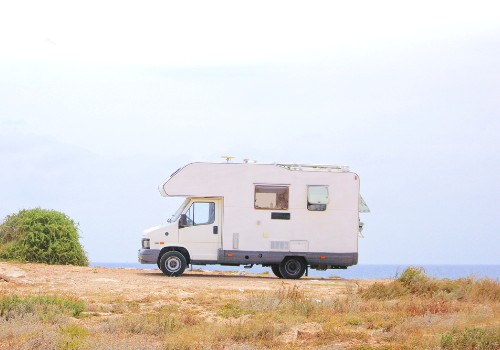
If you pull into a park with a smoking, smelly, dripping, or loudly running engine on your motorhome or tow vehicle, you’re going to have problems.
Aside from the noise and smell bothering other campground guests, any dripping or leaks will instantly cause staff to turn you away.
Contaminating the ground with oil or harmful fluids or chemicals will lead to fines from inspectors and cause damage to grass or cement parking pads that are costly to fix.
Repair any engine issues to avoid sticking out and giving the RV park a reason to turn you away.
Arrive After Hours
Many campgrounds have online payment and after-hour check-in available.
You typically will pull in to find an envelope with your reservation details and campsite number on a clipboard near the office door.
Some parks have no requirement for pre-payment and leave a list of open campsites near the entrance for anyone coming in after hours.
Park your camper, and in the morning, head back to the office to officially check in for a more extended stay, or get up and leave in the morning if you’re traveling on.
Park staff that live on-premises will rarely scope out your camper upon arrival, as they are tired and want to stay in bed.
If you’re staying for several days and your camper isn’t a total eyesore, rarely will staff ask you to leave no matter how old your RV since you’re already there and set up.
Stay at State or National Parks
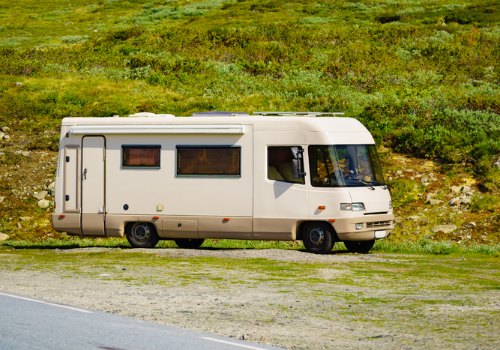
If state or national parks have RV age rules, I’ve never heard of it.
I’ve never been asked how old my RV is when making a reservation at these campgrounds, and I’ve seen plenty of recreational vehicles there that I know wouldn’t pass muster at a private RV park.
If you think you’ll have issues with the appearance of your old RV, consider RV camping at national or state parks if you want electric and water hookups.
The bonus is that most campsites at these parks are more affordable, spacious, and relaxing than those at standard RV parks.
Final Thoughts
For every campground that asks for RV age, there are plenty of tricks to circumvent the 10-year rule so you can continue to camp just about anywhere you wish with no hassles.
Please remember that a quality RV should last you for decades.
As long as your RV is in good shape, don’t let age-restriction rules scare you away from buying or keeping an older camper.
New, old, or “vintage” RVs bring the world to your doorstep, so don’t let the infamous 10-year RV age rule prevent you from enjoying the view!
The ’10 Year’ Rule (Video)
"Man cannot discover new oceans unless he has the courage to lose sight of the shore."
-- Andre Gide

